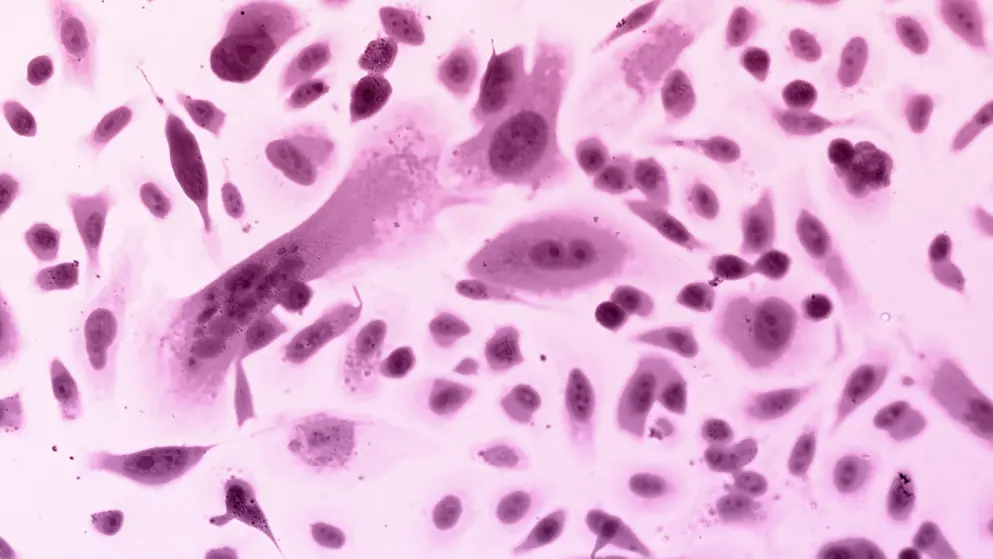New Data Confirms Safety and Efficacy
New subgroup data from the Phase III ARANOTE trial show darolutamide plus androgen deprivation therapy (ADT) improved radiological progression-free survival (rPFS) in patients with high and low-volume metastatic hormone-sensitive prostate cancer (mHSPC) by 40% and 70% respectively, compared to placebo plus ADT
The full results were presented during the ASCO GU Congress 2025.
Results from the Phase III ARANOTE trial presented at ESMO 2024 showed that darolutamide plus ADT significantly reduced the risk of radiological progression or death by 46% compared to placebo plus ADT (HR 0.54; 95% CI 0.41–0.71; P<0.0001), in patients with mHSPC. The overall incidence of adverse events was low and similar across treatment groups in both the high and low-volume subgroups, consistent with the overall population.
The ARANOTE trial is a randomized, double-blind, placebo-controlled Phase III study designed to assess the efficacy and safety of darolutamide plus ADT in patients with mHSPC. 669 patients were randomized to receive 600mg of darolutamide twice daily or matching placebo in addition to ADT. The primary endpoint of this study is rPFS, measured as time from randomization to date of first documented radiological progressive disease or death due to any cause, whichever occurs first. Secondary endpoints include overall survival (time to death from any cause), time to first castration resistant event, time to initiation of subsequent anti-cancer therapy, time to PSA progression, PSA undetectable rates, time to pain progression, and safety assessments.
In the ARANOTE trial, patients with mHSPC were randomized 2:1 to receive darolutamide plus ADT versus placebo plus ADT. High-volume disease was defined by the presence of visceral metastases and/or ≥4 bone metastases with ≥1 beyond the vertebral column/pelvis, as delineated in the CHAARTED criteria. Of 669 patients included in the full analysis set, 472 (71%) had high-volume disease and 197 (29%) had low-volume disease.
The subgroup analysis showed that, in the low-volume subgroup, darolutamide plus ADT reduced the risk of radiological progression or death by 70% (hazard ratio [HR]=0.30; 95% CI: 0.15–0.60) with median rPFS not reached, compared to placebo plus ADT. In the high-volume subgroup, darolutamide plus ADT reduced the risk of radiological progression or death by 40% (HR=0.60; 95% CI: 0.44–0.80) with median rPFS of 30.2 months with darolutamide versus 19.2 months with placebo. For the secondary endpoints, darolutamide delayed time to mCRPC (HV: HR 0.46; 95% CI: 0.36–0.60; LV: HR 0.21; 95% CI: 0.12–0.37) and time to prostate-specific antigen (PSA) progression (HV: HR 0.34; 95% CI: 0.25–0.46; LV: HR 0.19; 95% CI: 0.10–0.37) and a higher proportion achieved PSA <0.2 ng/mL with darolutamide vs placebo (HV: 54.6% vs 15.5%; LV: 82.6% vs 25.4%) in high and low-volume subgroups. Treatment-emergent adverse events were low and similar across both high- and low-volume subgroups, consistent with the overall population.
“These latest findings from the ARANOTE trial, in addition to data seen in the ARASENS trial, provide further evidence of the strong efficacy and consistent safety profile of darolutamide plus ADT in mHSPC across both high- and low-volume disease, whether used with or without docetaxel,” said Prof. Fred Saad, Chairman of Surgery and Director of Genitourinary Oncology at the University of Montreal Hospital Center (CHUM), and Principal Investigator of ARANOTE trial. “This robust data reinforces darolutamide’s potential foundational treatment option for physicians, providing, once approved, flexibility to tailor care with or without chemotherapy while addressing the diverse needs of prostate cancer patients.”
“At Bayer, our mission is centered on transforming prostate cancer care and improving patient outcomes across all disease stages. The expanding body of evidence for darolutamide highlights its significant potential in addressing the diverse needs of prostate cancer patients,” said Christine Roth, Executive Vice President, Global Product Strategy and Commercialization and Member of the Pharmaceuticals Leadership Team at Bayer. “This includes not only improving survival and significantly slowing down progression of the disease but also ensuring patients can maintain their daily activities with minimal interference by other medications.”
Other data presented at ASCO GU 2025 included an age-related subgroup analysis of the phase III ARASENS trial and additional real-world data analysis, both in mHSPC patients showing positive responses with darolutamide in combination with ADT and docetaxel across key clinically relevant endpoints.
Data from the ARASENS subgroup analysis of 1,305 patients with ages ranging from 41–89 years showed that patients with mHSPC benefited from darolutamide in combination with ADT and docetaxel, irrespective of age (<75 y and ≥75 y). Consistent improvements were seen in overall survival (OS), time to mCRPC, and time to initiation of subsequent therapy. Darolutamide was well tolerated in both age subgroups, with similar incidences of treatment-emergent adverse events versus placebo.
Additionally, a retrospective cohort analysis of androgen receptor pathway inhibitor triplet therapy found that therapy with darolutamide in combination with ADT and docetaxel led to lower probability of treatment discontinuation, lower probability of progression to mCRPC, and a higher number of patients achieving PSA responses versus abiraterone plus ADT plus docetaxel.


